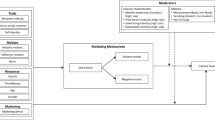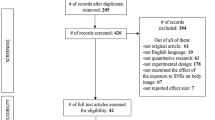Abstract
College students (N = 207) were asked their level of interest in sex, dating, and friendship affiliation before or after eating dinner at a dining hall. The threat of hunger before dinner was predicted to make participants focus on satisfying this need and therefore be less interested in social activities, compared to participants after dinner who were not hungry. Consistent with predictions, hungry males and females were less interested in sex, dating, and hanging out with friends compared to individuals who had just eaten. Results are considered in the context of motivation theory and recent research findings in the areas of physical attraction and social inclusion.
Similar content being viewed by others
References
Alderfer, C. (1969). An empirical test of a new theory of human needs. Organizational Behavior and Human Performance, 4, 142–175.
Alderfer, C. (1972). Existence, relatedness, and growth. New York: Free Press.
Brown, C. M., Young, S. G., Sacco, D. F., Bernstein, M. J., & Claypool, H. M. (2009). Social inclusion facilitates interest in mating. Evolutionary Psychology, 7, 11–27.
Kenrick, D. T., Griskevicius, V., Neuberg, S. L., & Schaller, M. (2010). Renovating the pyramid of needs: contemporary extensions built upon ancient foundations. Perspectives on Psychological Science, 5(3), 292–314.
Maslow, A. H. (1943). A theory of human motivation. Psychological Review, 50(4), 370–396.
Maslow, A. H. (1968). Toward a psychology of being. New York: Van Nostrand Reinhold Co.
Maslow, A. H. (1970). Motivation and personality (2nd ed.). New York: Harper and Row.
Nelson, L. D., & Morrison, E. L. (2005). The symptoms of resource scarcity: judgments of food and finances influence preferences for potential partners. Psychological Science, 16, 167–173.
Nelson, L. D., Pettijohn, T. F., II, & Galak, J. (2007). Mate preferences in social cognitive context: When environmental and personal change leads to predictable cross-cultural variation. In V. Swami & A. Furnham (Eds.), Body beautiful: evolutionary and socio-cultural perspectives (pp. 185–206). New York: Palgrave.
Pettijohn, T. F., II, Sacco, D. F., Jr., & Yerkes, M. J. (2009). Hungry people prefer more mature mates: a field test of the environmental security hypothesis. The Journal of Social, Evolutionary, and Cultural Psychology, 3(3), 216–232.
Swami, V., & Tovee, J. (2006). Does hunger influence judgments of female physical attractiveness? British Journal of Psychology, 97, 353–363.
Author information
Authors and Affiliations
Corresponding author
Rights and permissions
About this article
Cite this article
Pettijohn, T.F., Ahmed, S.F. & Pettijohn, T.F. Hunger and Social Motivation: Hungry People are Less Interested in Social Activities than Satiated People. Curr Psychol 31, 1–5 (2012). https://doi.org/10.1007/s12144-012-9127-4
Published:
Issue Date:
DOI: https://doi.org/10.1007/s12144-012-9127-4




